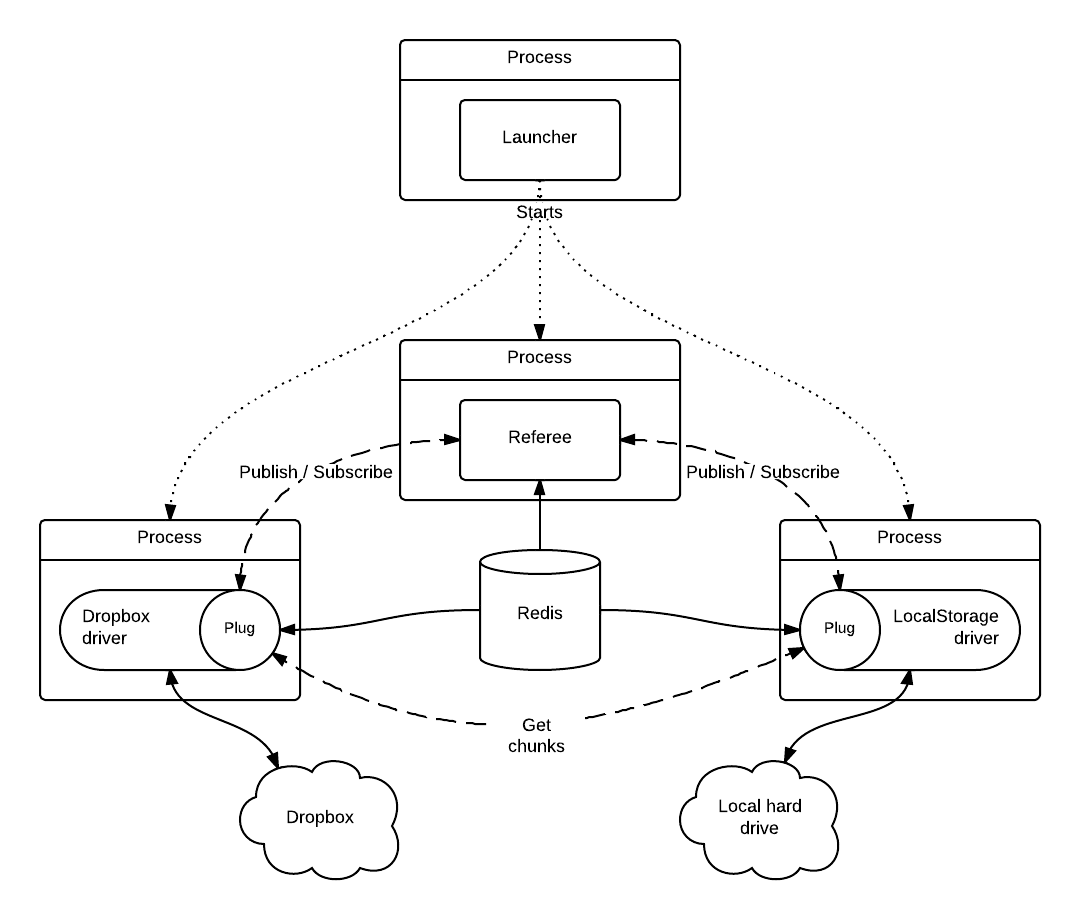Getting started¶
Onitu at a glance¶
Onitu must deal with a lot of events coming from different places. Therefore, Onitu is build around an asynchronous model. Each part runs in a separate process, and communicate with the others via ZeroMQ messages and Redis.
In order to synchronize files between external services, Onitu uses a system of drivers. You can find more information about this system in Creating a new driver. Each driver sends events and receives orders from the Referee, which chooses where the files should be synchronised according to the configuration rules.
Glossary¶
- Driver
- A program making the junction between Onitu and a remote service (SSH, Dropbox, a hard drive…). cf Creating a new driver
- Entry
- A driver configured by the user. For example, it can be the Dropbox driver configured to run with a specific account. You can view an entry as an instance of a driver.
- Rule
- Maps a set of matching files to a set of entries. Used in the configuration to split up the files.
- Setup
- A JSON configuration file, which describes the entries and the rules.
- Referee
- Receive events from the drivers and allocate the files among the entries regarding the configuration rules. cf Referee
- Plug
- A helper class which implements all the boilerplate needed by a driver to communicate with Onitu. cf Plug
- Handler
- A function defined by a driver, which responds to a specific task. This function will be called by the Plug when needed. cf Handlers
Global architecture¶
You can here find an illustration of the global architecture of Onitu: Figure 1.1.

A schematic illustrating the global architecture of Onitu with two drivers.
Dependencies¶
The core of Onitu uses several libraries (other dependencies exists but are specific to some drivers):
- Circus
- Used to start, manage and monitor the different processes
- PyZMQ
- A binding of the ZeroMQ library for the Python language
- redis-py
- A library to communicate with Redis in Python
- Logbook
- A powerful logging library that allows Onitu to log on a ZeroMQ channel, aggregating all the logs in the same place
Technical choices¶
We made some difficult technical choices in order to build Onitu in the most maintainable and efficient way. Those choices can be questionable, but here are our motivations :
Python¶
Python is a general-purpose and flexible language. This was our first choice because all of us were already using and loving it. It allows us to distribute Onitu easily, without having to compile the sources or distribute binaries. Python is available on a lot of different systems, has a lot of built-in functionalities and is easy to understand and read.
You might have some concerns regarding the speed, but Onitu is an I/O bound application, so most of the time it is not executing Python code but downloading/uploading files or exchanging information over sockets. The same program with a low-level language like C would introduce a lot of complexity and probably only a very small performance amelioration.
ZeroMQ¶
As Onitu is an application with a lot of different processes and threads, we need a way to communicate between them. ZeroMQ is a layer on top of IP and Unix sockets, and provides messaging patterns. Onitu uses several of them, like ROUTER/DEALER, PUBLISH/SUBSCRIBE and REQUEST/REPLY.
ZeroMQ is really fast, available on a lot of platforms and has Python bindings. It is much more flexible and lightweight than other message brockers, such as RabbitMQ or ActiveMQ.
Redis¶
Onitu needs to store information in a persistent database. This database should be cross-platform, schema-less and easy to install and maintain. For that purpose, Redis has been chosen. But Redis is not available in the same version on all platforms, and is not really persistent. Also, the entire database is in-memory, limiting its size. Therefore, another solution will soon be chosen to replace it as it is not the perfect solution.